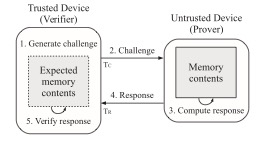PhD Theses: Monitoring the health and integrity of Wireless Sensor Networks
Rodrigo Vieira Steiner
Wireless Sensor Networks (WSNs) will play a major role in the Internet of Things collecting the data that will support decision-making and enable the automation of many applications. Nevertheless, the introduction of these devices into our daily life raises serious concerns about their integrity. Therefore, at any given point, one must be able to tell whether or not a node has been compromised. Moreover, it is crucial to understand how the compromise of a particular node or set of nodes may affect the network operation. In this thesis, we present a framework to monitor the health and integrity of WSNs that allows us to detect compromised devices and comprehend how they might impact a network’s performance. We start by investigating the use of attestation to identify malicious nodes and advance the state of the art by exploring limitations of existing mechanisms. Firstly, we tackle effectiveness and scalability by combining attestation with measurements inspection and show that the right combination of both schemes can achieve high accuracy whilst significantly reducing power consumption. Secondly, we propose a novel stochastic software-based attestation approach that relaxes a fundamental and yet overlooked assumption made in the literature significantly reducing time and energy consumption while improving the detection rate of honest devices. Lastly, we propose a mathematical model to represent the health of a WSN according to its abilities to perform its functions. Our model combines the knowledge regarding compromised nodes with additional information that quantifies the importance of each node. In this context, we propose a new centrality measure and analyse how well existing metrics can rank the importance each sensor node has on the network connectivity. We demonstrate that while no measure is invariably better, our proposed metric outperforms the others in the vast majority of cases.
